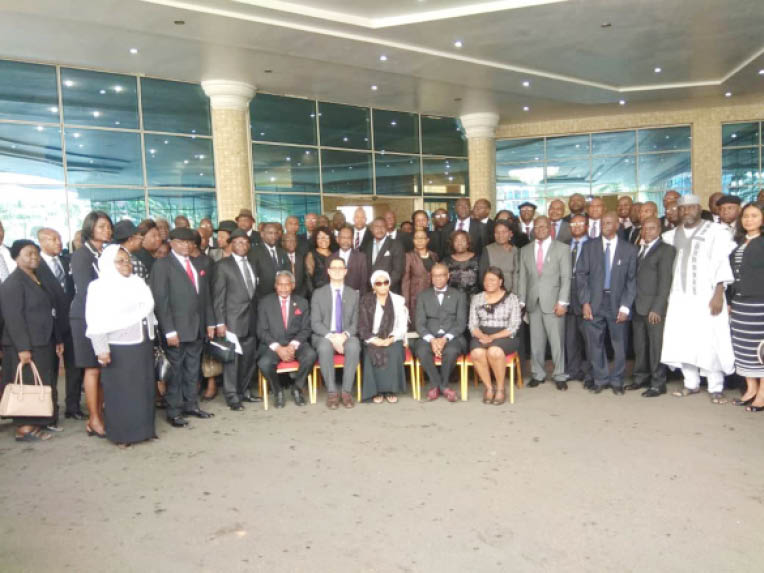2019 Elections: Judiciary set, trains tribunal members
As the 2019 general elections get underway, the judiciary on its part is putting finishing touches in its preparations to adjudicate on disputes arising from the conduct of the elections. The judiciary is charged with adjudication on election disputes through the elections petitions tribunals that would sit in the months following the Presidential and National […]

FILE PHOTO
As the 2019 general elections get underway, the judiciary on its part is putting finishing touches in its preparations to adjudicate on disputes arising from the conduct of the elections.
The judiciary is charged with adjudication on election disputes through the elections petitions tribunals that would sit in the months following the Presidential and National Assembly elections.
Just like the Independent National Electoral Commission (INEC), the Nigeria Police and other security agencies, the Central Bank of Nigeria and other institutions are involved in the election preparations. Just like the supporting agencies and organisations involved in the smooth conduct of the elections, the judiciary has been preparing the newly inaugurated members of the election petitions tribunals for the disputes arising therefrom.
A total of 730 election petitions were brought to the Court of Appeal after the 2015 general elections. Of this, 39 were from governorship elections petitions, while it also received 79 senatorial petitions, 179 House of Representatives, and 380 State Houses of Assembly petitions.
Section 285 (2) (3) of the 1999 Constitution provides for the establishment of election petitions tribunals. But the Court of Appeal under sections 239(1), 240 of the constitution has original jurisdiction to hear and determine the validity of a person elected to the office of the president or vice president.
Because of their special nature, Section 134 (2) and (3) of the Electoral Act, 2010, provides for time limit for election petitions for within 180 days. And similar provisions are contained in Section 285(6) and (7) of the 1999 Constitution (as amended).
The provision reads thus: “An election tribunal shall deliver its judgement in writing within 180 days from the date of filing of the petition.”
And Subsection (7) of Section 285 of the constitution provides that: “An appeal from a decision of the election tribunal or court shall be heard and disposed of within 60 days from the date of the delivery of judgment.”
As part of the preparations, the Court of Appeal last week organized a two-day national training programme for the 250 members of the elections petitions tribunals in conjunction with the International Foundation for Electoral Systems (IFES) in Abuja.
The tribunal members were on January 26 inaugurated by the acting Chief Justice of Nigeria (CJN), Justice Tanko Muhammed.
Topics treated for the judges included: ‘The Amendments of the Constitution and the Electoral Act as at 2018’, ‘Pertinent Issues in the Determination of Election Challenges and the Way Forward’ and the ‘Structure of the Judicial System in Election Dispute and in the Electoral Process.’
Other papers presented to the judges were: ‘The Role and Impact of Conflicting Judgments on the Electoral Process with Emphasis on the 2015 Elections’ and an overview of the papers presented during the training.

Speaking during the training programme, the President of the Court of Appeal (PCA), Justice Zainab Bulkachuwa, charged the judges not to grant long adjournments or use technicalities that could cause delays in the dispensation of petitions brought before them. She also cautioned them against any conduct that would further dent the image of the judiciary, which is presently witnessing challenges.
“The Nigeria judiciary is now in the limelight and is on trial. Let us as judicial officers discharge the responsibility reposed on us both individually and collectively by dispensing justice in accordance with the law,” she said.
“We should serve justice without fear or favour, affection or ill-will within the dictates of our conscience and oath of office.
“I need not remind you that each tribunal member will be closely monitored by the office and I will not hesitate to descend on any judge found wanting in the discharge of his or her duties.
“I do not need to remind you that the task ahead of you is enormous and I implore you to exhibit professionalism and due diligence in the discharge of your duties.
“Be in control of your courts. Do not allow yourselves to be steered around by emotions, fear or sentiment.
“By the end of this conference, your lordships will be deployed to various states of the federation for your primary assignment,” Justice Bulkachuwa stated.
In his remarks at the ceremony, the Vice President of IFES, Michael Svetlick, said the training was for judges who would participate in the elections tribunal to do their duties efficiently and effectively based on the provisions of the law.
While thanking donor agencies such as USAID and UKAID, he commended the role of the judiciary in the conduct of elections in the country.
“I would like to appreciate the judges, justices, INEC and other stakeholders for their participation at this event which highlights our collective resolve to work together to improve Nigeria’s electoral process,” he said.
